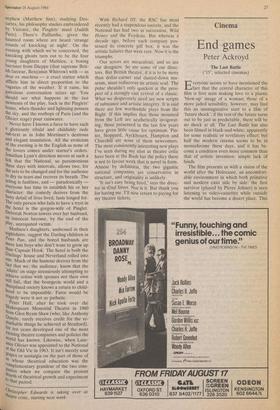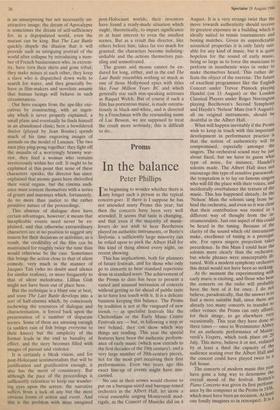Cinema
End games
Peter Ackroyd
The Last Battle ('15', selected cinemas)
-`veryone seems to have mentioned the 4
fact that the central character of this film is first seen making love to a plastic `blow-up' image of a woman; those of a more jaded sensibility, however, may find this an unimaginative start to a film of 'future shock'; if the rest of the future turns out to be just as predictable, there will be no shock at all. The Last Battle has also been filmed in black-and-white, apparently for some realistic or revelatory effect; but half the modern cinema seems to be in monochrome these days, and it has be- come a condition even more common than that of artistic invention: simple lack of funds.
The film presents us with a vision of the world after the Holocaust, an uncomfort- able environment in which both primitive and modern exist side by side: the first survivor (played by Pierre Jolinet) is seen listening to video-cassettes while outside the world has become a desert place. This
is an unsurprising but not necessarily un- attractive image: the dream of Apocalypse is sometimes the dream of self-sufficiency for, in a depopulated world, even the mutant can be king. But The Last Battle quickly dispels the illusion that it will provide such an intriguing portrait of the world after collapse by introducing a num- ber of French businessmen who, in extrem- ity, have torn their shirts and gone tribal; they make noises at each other, they keep a slave who is dispatched down wells to search for water, and they generally be- have as film-makers and novelists assume that human beings will behave in such circumstances.
Our hero escapes from the ape-like exe- cutives by constructing, with an ingen- uity which is never properly explained, a small plane and eventually he finds himself in an abandoned clinic; here a bewildered doctor (played by Jean Bouise) spends much of his time engraving images of animals on the model of Lascaux. The two men play ping-pong together; they fight off the assaults of a worryingly brawny war- rior, they feed a woman who remains mysteriously within her cell. It ought to be explained at this point that none of these characters speaks; the director has since explained that atomic gases have shrivelled their vocal organs, but the cinema audi- ence must content themselves with a series of grunts and murmurs which, fortunately, do no more than justice to the rather primitive nature of the proceedings.
This absence of dialogue does have certain advantages, however; it means that inexplicable events need never be ex- plained, and that otherwise extraordinary characters are in no position to suggest any reason for their decisions or activities; as a result, the credibility of the film can be maintained for roughly twice the time than would otherwise be the case. Sometimes this brings the action close to that of silent comedy, very much in the manner of Jacques Tati (who no doubt used silence for similar reaons), or more frequently to that of silent melodrama. Lillian Gish might not have been out of place here.
But the technique is a blunt one at best, and soon The Last Battle develops into a sort of half-cinema which, by consciously eschewing the resources of dialogue and characterisation, is forced back upon the presentation of a number of disparate scenes. Some of them are amusing enough (a sudden rain of fish brings everyone to their knees) but the simplicity of the format leads in the end to banality of effect, and the story becomes filled with images of pursuit and violence.
It is certainly a bleak vision, and for post-Holocaust sentimentalists that will be justification and gratification enough; it also has the merit of consistency. But although the pace of the proceedings is sufficiently relentless to keep our wander- ing eyes upon the screen, the narrative suffers from a lack of any but the most obvious forms of action and event. And this is the problem with most imagined post-Holocaust worlds; their inventors have found a ready-made situation which ought, theoretically, to impart significance or at least interest to even the smallest scenes. But as a result this director, like others before him, takes far too much for granted: the characters become indisting- uishable and the -actions themselves puz- zling and unmotivated.
The grunts and moans cannot be en- dured for long, either, and in the end The Last Battle resembles nothing so much as one of those Hollywood epics with titles like Four Million Years BC and which generally star such non-speaking actresses as Raquel Welch. But of course if such a film has portentous music, is made ostenta- tiously in black-and-white, and is directed by a Frenchman with the resounding name of Luc Besson, we are supposed to treat the result more seriously; this is difficult to do.







































 Previous page
Previous page